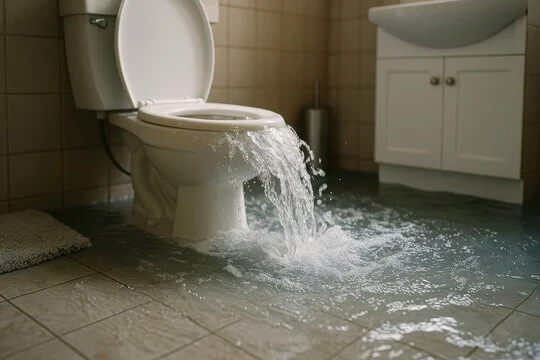Who’s Responsible for Repairs? Guidelines for Massachusetts Landlords and Tenants
If you’re a landlord in Massachusetts, it’s important to understand which repairs are your responsibility and which are not. The same is true for tenants. When everyone is clear on who handles what, properties run more smoothly, communication improves, and costly problems are easier to avoid.
At PropertyCraft, we manage buildings of all sizes and ages, and we’ve seen firsthand how clarity in maintenance roles leads to better outcomes for both landlords and tenants. This guide is here to help you know where your responsibilities begin and end.
Landlord Responsibilities
Massachusetts has specific requirements for what landlords must provide when it comes to keeping a rental unit liveable, as dictated by the State Sanitary Code.
Heat
From September 16 through June 14, landlords must provide a heating system that can maintain temperatures between 68 and 78 degrees Fahrenheit from 7 a.m. to 11 p.m. and at least 64 degrees overnight. If the written lease does not specify otherwise, landlords are also responsible for paying for the heat, hot water, and electricity.
Kitchen facilities
Each apartment must have a working sink suitable for daily use, as well as a stove and oven that function properly. Landlords are not required to provide a refrigerator, but if one is provided it must be kept in working condition.
Water and hot water systems
Landlords must provide hot water at a temperature between 110 and 130 degrees Fahrenheit. Even if the lease states that tenants will pay for water, landlords remain responsible for ensuring the plumbing infrastructure is working properly. If you plan to charge tenants for water, the unit must have a legally installed meter and billing system in place, approved through the Massachusetts Department of Public Health.
Structural elements
Foundations, floors, walls, roofs, doors, windows, and ceilings must be weather-tight and in good repair. Landlords must ensure these elements are free from chronic dampness and are properly maintained throughout the tenancy.
Pest control
In buildings with two or more units, the landlord is responsible for keeping the property free of rodents, insects, and other infestations. If a tenant’s behavior directly causes the problem, they may become responsible, but the starting point is the landlord.
Exits and common areas
Landlords must keep all exits clear of snow, trash, and any other obstructions. This applies during storms, turnovers, and every day in between. Hallways, stairwells, and other shared spaces must be maintained in a clean and safe condition.
Electrical and plumbing systems
Even when tenants pay for utilities, landlords are required to maintain the wiring, outlets, and fixtures in safe working order. The same applies to plumbing systems. If a toilet backs up due to a structural or system-wide issue, it falls to the landlord to fix it.
Before a new tenant moves in
It is a good practice to perform a full inspection of the unit after one tenant leaves and before the next arrives. This helps catch problems early, creates a record of the property’s condition, and shows prospective tenants that you take pride in offering a well-maintained space.
Tenant Responsibilities
While landlords carry much of the responsibility for keeping a property functional, tenants also play a key role in maintaining their unit and reporting issues quickly.
Routine upkeep
Tenants are responsible for basic day-to-day maintenance. This includes changing light bulbs, replacing smoke detector batteries, keeping the unit clean, and properly using appliances and fixtures.
Timely reporting
Tenants should report leaks, damage, or system failures as soon as they notice them. Quick reporting can prevent a minor issue from turning into a major one, which benefits both the tenant and the property owner.
Respectful use of the space
Tenants are expected to use electrical, plumbing, and heating systems properly. Misuse, such as flushing inappropriate items or overloading electrical circuits, can result in the tenant being responsible for resulting damage.
Minor repairs with permission
Some tenants may be comfortable fixing small issues like loose handles or minor paint touch-ups. In most cases, these kinds of repairs require approval from the landlord. Larger repairs should never be attempted without express permission.
Accidental damage
If damage occurs due to tenant negligence or accident, the tenant is responsible for the repair. Open communication is the best way to handle these situations. Being proactive usually leads to a better outcome for everyone.
Understanding Wear and Tear
Normal aging of a unit is the responsibility of the landlord. This includes faded paint, worn flooring, and minor surface scuffs. These are not considered damage and should not be deducted from a tenant’s security deposit.
Intentional or careless damage, such as broken windows, stained carpets from pets, or improperly mounted TVs causing wall damage, is different. That kind of repair is usually handled by the tenant or deducted from their deposit after proper documentation.
If there is ever confusion about what qualifies as wear and tear versus tenant damage, we recommend both parties document the unit’s condition with photos and walk-throughs at move-in and move-out.
Common Questions
Who handles a clogged toilet?
If the clog is due to a plumbing issue or failing pipes, the landlord handles the repair. If the clog is caused by something a tenant flushed, the tenant is typically responsible.
Can tenants pay for repairs and deduct the cost?
In rare cases, yes. But tenants must first notify the landlord in writing and allow a reasonable amount of time for the issue to be resolved. This option is typically limited to urgent repairs related to habitability, such as loss of heat or water. We recommend tenants seek legal advice before taking this route.
Can landlords charge a late fee right away?
Massachusetts law does not allow landlords to charge late fees unless the rent is more than 30 days late. However, there is no required grace period for paying rent. It is technically due on the day stated in the lease.
Source: masslandlords.net

